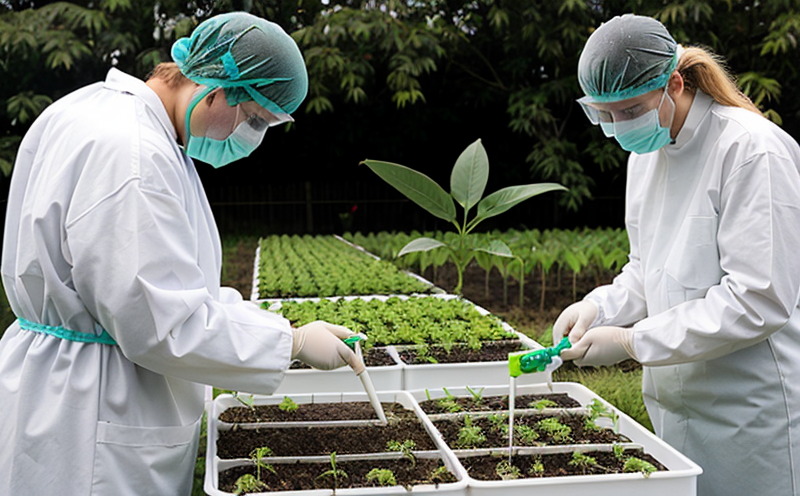Microscopic Examination for Fungal Spores
The microscopic examination of fungal spores is a critical process in agriculture and forestry testing. This method involves the use of advanced optical microscopes to identify, quantify, and characterize fungal spores present in plant material or soil samples. The primary goal is to provide accurate and reliable information that aids in diagnosing diseases caused by fungi, ensuring the health and productivity of crops.
Fungi play a significant role in both beneficial and detrimental ways within agricultural ecosystems. While some fungi contribute positively to nutrient cycling and decomposition processes, others can lead to severe crop losses if not managed properly. By identifying fungal spores through microscopic examination, laboratories like Eurolab offer precise diagnostics that enable farmers and researchers to take targeted actions against harmful pathogens.
The process begins with sample collection from fields, greenhouses, or other relevant environments where disease symptoms have been observed. Samples may include leaves, stems, roots, or soil samples depending on the suspected pathogen type. Once collected, these samples undergo rigorous preparation techniques such as washing, staining (to enhance visibility), and mounting onto slides.
Optical microscopes equipped with high-resolution lenses and digital imaging systems are used to examine each slide under different magnifications. This allows for detailed observation of spore morphology including size, shape, coloration patterns, and other distinguishing features which can differentiate between various species of fungi. Additionally, polarized light microscopy might be employed when examining certain types of fungal structures.
Identification of fungal spores is based on their microscopic characteristics compared against reference collections maintained by recognized institutions such as the American Type Culture Collection (ATCC) or European Fungus Collection (EFC). Once identified, quantitative analysis can also provide insight into potential levels of infection within a given area. This information helps guide appropriate management strategies including fungicide applications or cultural practices aimed at reducing disease incidence.
Accurate diagnosis via microscopic examination supports sustainable agricultural practices by enabling early detection and intervention against economically important fungal diseases. Proper identification ensures targeted treatments which minimize unnecessary pesticide use while maximizing crop yield potential. Moreover, this service plays an essential role in supporting research efforts focused on understanding the complex relationships between plants and fungi.
In conclusion, the microscopic examination of fungal spores is a cornerstone of effective disease management strategies within agricultural settings. Through meticulous sample preparation followed by detailed observations using advanced optical microscopes, Eurolab provides invaluable diagnostic insights that contribute to healthier crops and more resilient ecosystems.
- Improved Crop Health: Early detection allows for prompt treatment, preventing widespread outbreaks.
- Sustainable Practices: Targeted interventions reduce overuse of chemicals, promoting environmentally friendly farming methods.
- Enhanced Research: Accurate identification facilitates ongoing studies into plant-fungal interactions and new disease emergence.
At Eurolab, we pride ourselves on offering unparalleled expertise in agriculture & forestry testing services. Our dedicated team of highly qualified professionals ensures that every sample receives the highest standard of care and attention-to-detail. Leveraging state-of-the-art facilities equipped with cutting-edge technology, including advanced optical microscopes capable of magnifying up to 1000x, allows us to provide precise diagnoses even for complex samples.
We employ internationally recognized standards such as ISO 17025 for quality assurance and ISO/IEC 17026 for proficiency testing which guarantee the reliability and accuracy of our results. Our commitment to excellence is further demonstrated through continuous training programs that keep our staff updated on the latest developments in agricultural science.
Our global network of partners ensures seamless integration across borders, providing access to additional resources when needed. Additionally, Eurolab maintains strict confidentiality protocols ensuring all client information remains secure and protected from unauthorized disclosure.
Customer Impact and Satisfaction
The microscopic examination service at Eurolab has had a profound impact on numerous clients across the agricultural sector. Farmers now have access to timely and accurate diagnostic tools, enabling them to make informed decisions about their crop health. This not only improves yield but also reduces economic losses associated with plant diseases.
- Increased Productivity: Timely treatment based on precise diagnoses leads to healthier crops resulting in increased harvests.
- Economic Benefits: Reduced reliance on broad-spectrum pesticides translates into cost savings for producers.
- Environmental Protection: Targeted treatments reduce the environmental footprint associated with excessive chemical usage.
Moreover, our services support academic institutions conducting research aimed at better understanding plant-fungal interactions. By providing reliable data and insights, we contribute to advancements in scientific knowledge which ultimately benefit society as a whole.
International Acceptance and Recognition
The microscopic examination of fungal spores conducted by Eurolab meets or exceeds international standards set forth by organizations such as ISO (International Organization for Standardization), EN (European Norms), ASTM (American Society for Testing and Materials), and IEC (International Electrotechnical Commission). These certifications demonstrate our commitment to maintaining the highest levels of quality assurance and proficiency testing.
Our methodologies are regularly evaluated through rigorous internal audits as well as external assessments conducted by independent bodies. This ensures ongoing compliance with global best practices, thereby enhancing trust among clients worldwide.
Evidence of our international recognition includes collaborative projects with leading universities and research institutions across Europe, North America, Asia, and Africa. These partnerships further validate the robustness and reliability of our diagnostic techniques used in identifying fungal spores.





